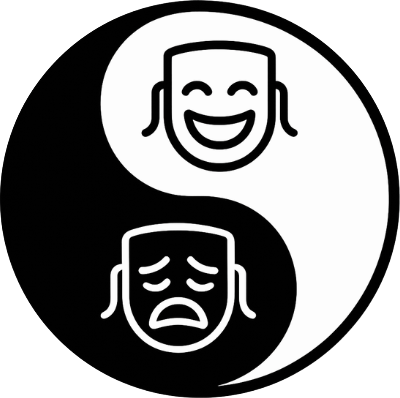Commitment Issues
"You don't have to be great to start, but you have to start to be great." ~ Zig Ziglar
One of the biggest unlocks we've had in applying sport psychology to our personal process as an actor was fully absorbing the following: peak performers don't become peak performers because of superior external circumstances and / or internal experiences that make their achievements inevitable. Peak performers become peak performers because they take action toward their goals regardless of their external circumstances and / or internal experiences.[1]
That paradigm shift came some time ago now, but it's still one of the most profound performance-related "aha" moments we've had.
If you've jammed with us 1-on-1 or had us visit your drama school, you'll know we draw heavily on the Mindfulness-Acceptance-Commitment (MAC) protocol (hat-tip to creators, Frank L. Gardner and Zella E. Moore).
We've already touched on acceptance, and have a whooooole bunch of mindfulness goodness incoming, so felt it was high time we started to unpack the commitment piece of the peak performance puzzle.
Backed by science; built for the stage and screen.
👊 Actors:
Get evidence-informed insights and strategies to support your performance and well-being. Join the Dojo e-newsletter tribe and make thriving your reality.
🧭 Drama schools & Production companies:
Bring pioneering, research-backed coaching into your classroom or rehearsal room. Let's talk about supporting your actors to perform at their peak – and stay well in the process.
Committing in theory
In addition to drawing on Gardner & Moore's protocol, we draw on their definition of commitment, too: "When one regularly and consistently demonstrates the specific behaviors and activities that are likely to directly result in optimal performance".[2] Key to this definition is the understanding that actions ("behaviors and activities") are "regularly and consistently" enacted.
We also weave in criteria from Acceptance and Commitment Therapy, which advocates for individuals to "self-select" and "self-monitor" their commitments, viewing "failure to meet them" with "curiosity and nonjudgment".[3]
Key, too, is distinguishing between commitment and motivation. Referencing our pals Gardner & Moore again: "We suggest that motivation is simply the desire for something. All people are motivated […] However, far fewer people are actually committed to doing the things necessary to perform better".[4]
Commitment = actually doing. Motivation = desiring to do.
Why does any of this matter? Because, to circle back to the top of this article, peak performers are peak performers because they take action toward their goals regardless of their external circumstances and / or internal experiences. Not just when everything in their life is "perfect". Not just when they "feel like it". Peak performers don't wait for motivation. They commit whether motivation shows up or not.
Committing in practice
Before we tackle the tactical, there are two *s to add.
First *: for our fellow Type As, commitment doesn't automatically mean doing more. Commitment also doesn't mean doing hard things for the sake of doing hard things.[5] If we scroll back up to the definition we're using, we see that commitment means engaging in "specific" actions (i.e., only a few), "likely to directly result in optimal performance" (i.e., only toward outcomes we actually care about).
So, if you haven't already, make sure you've defined "success" for yourself, and reverse-engineered your highest probability path there.
Second *: for our friends navigating clinically diagnosed physical and / or mental health challenges, let's make sure we combine commitment with a healthy dose of compassion, yeah? Some days, giving 100% won't be on the table. 20% might be the absolute limit of what you can muster. That is so valid and okay and fine. Aim to give 100% of that 20%, and with compassion, rather than self-flagellation.
In the words of key figures behind Acceptance and Commitment Therapy: "Progress is not defined by an absolute level of achievement but rather by the incremental choice to embrace the present and to step forward toward a life worth living".[6]
Now, let's tackle the tactical.
Making a commitment game plan can boost chances of success,[7] so we usually coach actors through crafting one. Here's an overview of the process:
- In a notebook or e-note, write your current goal at the top.
e.g., Book a guest star role in a major TV drama by April 2026.
- Below your goal, list 1–3 answers to the following: what behaviours would you have to add / change / remove for this goal to become true?
e.g.,
1) Mock self-tape once a week.
2) Update showreel.
3) Cut social media time and double down on casting director emails.
- Then, for each of these high-leverage behaviours, identify the greatest obstacle to engagement.
e.g.,
1) Mock self-tape once a week: organisation.
2) Update showreel: money.
3) Cut social media time and double down on casting director emails: boredom.
- Finally, for each of these obstacles, list 1–2 ways you could minimise or mitigate them.
e.g.,
1) Mock self-tape once a week – organisation: arrange a weekly self-tape session with an actor friend, and treat it like attending a paid class.
2) Update showreel – money: get a quote from a showreel editor and set aside 10% of the fee for 10 weeks.
3) Cut social media time and double down on casting director emails – boredom: play fave playlist / podcast / TV show in the background.

As is so often the case, all the above can be applied to our lives as people, not just performers. In fact, we'd strongly encourage having one person-centric and one performer-centric commitment running in tandem. Prioritising intentional growth in non-actor areas of life may sound "meh" but can actually generate a massive sense of empowerment. And y'all know how we feel about an empowered tribe of actors 😉
TL;DR?
No worries. Here are the three key takeaways:
- Peak performers become peak performers by consistently taking steps toward their goals. They're not necessarily blessed with superior external circumstances and / or internal experiences. They simply move.
- Motivation and commitment are distinct concepts. Motivation is a desire to do something; commitment is actually doing the thing.
- Crafting and following a commitment game plan can increase our chances of achieving our goals.
Love what you're reading? Help us keep it flowing. Donations support the research, writing, and free sharing of evidence-informed tools for actor performance and well-being. Every dollar fuels our mission to make thriving a reality for actors everywhere 🔥
Citations
[1] [2] [4] [5] [7] https://amzn.to/4iLf3K3
[3] [6] https://doi.org/10.1177/0011000012460836
Cite us!
IG: @theactorsdojo
APA 7: Norrish, T. (2025, September 6). Commitment issues. The Actor’s Dojo. https://www.dojoactors.com/commitment/
